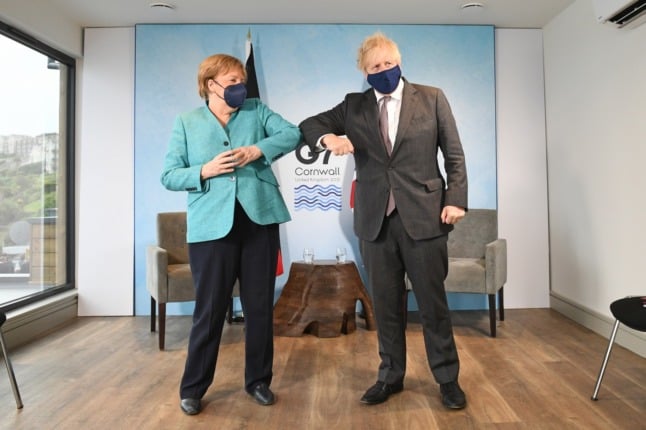Speaking in the Bundestag during a question and answer session on Wednesday, Merkel said that she would like to see European states enforce a quarantine for people coming from regions where the more contagious Delta variant is spreading, including Britain.
“In our country, if you come from Great Britain, you have to go into quarantine – and that’s not the case in every European country, and that’s what I would like to see,” Merkel said.
Germany put in place a ban on travel from the UK in May – despite high vaccination rates and a low number of cases at the time – over the spread of the Delta variant, which was first detected in India.
Other countries on Germany’s ‘virus variant of concern’ list include India, Brazil and South Africa.
There are some exceptions, including for German residents and citizens. But anyone who does arrive has to follow stricter pre-flight testing rules and quarantine for 14 days on arrival to Germany – regardless of whether they are fully vaccinated or not.
But there are different rules across Europe for travel, and particularly when it comes to UK arrivals. Spain, for instance, still has no restrictions in place for British tourists.
READ ALSO: What rules do European countries have in place for travel from the UK?
On Tuesday, Merkel said it was problematic to have a patchwork of travel regulations in Europe.
“I regret that we haven’t managed yet to have completely uniform action among the member states on travel guidelines – that is coming back to haunt us,” she told reporters.
Merkel cited the example of Portugal, where the government this month was forced to slow the process of post-lockdown reopening in Lisbon and three other municipalities after a hike in new Covid-19 cases.
READ ALSO: German health experts warn against travel to Covid Delta variant areas
‘Delta will make up 90 percent of cases in Europe’
Dr. Andrea Ammon, director of the European Centre for Disease Prevention and Control (ECDC), said on Wednesday that the Delta variant will likely make up 90 percent of all Covid cases in EU countries by the end of August.
It is believed to be between 40-60 percent more transmissible than the Alpha variant (first detected in Britain) and the current dominant strain in Germany.
“Based on available scientific evidence, the Delta variant is more transmissible than other circulating variants and we estimate that by the end of August it will represent 90 percent of all SARS-CoV-2 viruses circulating in the European Union,” Ammon said.
“Unfortunately, preliminary data shows that it can also infect individuals that have received only one dose of the currently available vaccines.
“It is very likely that the Delta variant will circulate extensively during the summer, particularly among younger individuals that are not targeted for vaccination. This could heighten the risk of more vulnerable individuals being infected and experiencing severe illness and death if they are not fully vaccinated.
READ ALSO: ‘Vaccinate quickly’: German states see surge in Delta variant cases
“The good news is that having received two doses of any of the currently available vaccines provides high protection against this variant and its consequences. However, about 30 percent of individuals older than 80 years and about 40 percent of individuals older than 60 years have not yet received a full vaccination course in the European Union.”
Ammon said that until vulnerable people are protected, the circulation of the Delta variant had to be kept as low as possible through public health measures – and vaccination should continue as fast as possible.
“At this stage it becomes crucial that the second vaccination dose is administered within the minimum authorised interval from the first dose, to speed up the rate at which vulnerable individuals become protected,” said Ammon.
“I am aware that it requires a significant effort from public health authorities and the society at large to achieve this goal. But now is the time to walk the extra mile.”
READ ALSO: Delta variant – how worried should Germany be about a new wave of cases?



 Please whitelist us to continue reading.
Please whitelist us to continue reading.
I assume then that the German football team will be enjoying 14 days isolation with no early release upon returning from Wembley next week? Or is that actually only aimed at those annoying, nasty Brexit-voting English people?
I think they will probably send half a team and the other half to pick up the trophy later.